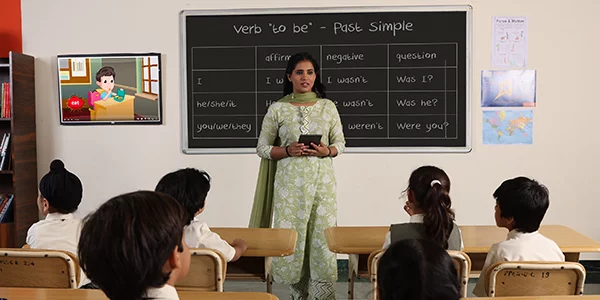Effective Primary Science Tuition Singapore for Better Exam Results
Effective Primary Science Tuition Singapore for Better Exam Results
Blog Article
Discover the Essential Benefits of Understanding Key Science for Young Students
The relevance of key scientific research education and learning for young learners prolongs much past mere expertise procurement; it works as an essential pillar in creating crucial skills such as vital reasoning, problem-solving, and creative thinking. Involving with scientific principles through inquiry-based and interactive activities not just cultivates interest but also prepares for resistant, certain students. As we discover these benefits even more, it ends up being clear that the effects for future academic and personal development are profound. What details approaches can teachers employ to make the most of these advantages?
Enhancing Critical Believing Skills
Cultivating important assuming abilities in young learners is necessary for their cognitive development and future scholastic success. Crucial reasoning makes it possible for children to analyze info, evaluate proof, and make educated decisions, which are crucial abilities in today's information-rich culture. By participating in clinical questions, young learners can enhance these skills as they discover principles through thinking, observation, and trial and error.
In main science education, teachers can facilitate vital reasoning by motivating pupils to ask concerns, formulate theories, and perform experiments. This hands-on method enables youngsters to practice analytic and create logical reasoning skills. For instance, when pupils check out the buildings of products or the concepts of activity, they find out to evaluate their searchings for seriously and reason based on proof.
In addition, conversations and joint projects can promote important thinking by providing opportunities for students to express their ideas, difficulty presumptions, and consider varied perspectives. By producing a helpful environment that values questions and representation, educators can support critical assuming skills that encourage young students to come to be lifelong learners and independent thinkers. Ultimately, improving these skills lays a durable structure for their future academic undertakings and individual growth.
Fostering Curiosity and Exploration

Main scientific research education supplies an organized atmosphere where young learners can explore different sensations with hands-on experiments and observations. By enabling them to connect with products and participate in inquiry-based knowing, teachers develop possibilities for youngsters to develop theories, test their concepts, and draw verdicts. Such experiences support a feeling of wonder and exhilaration regarding scientific research.

Structure Self-confidence in Issue Resolving
Structure self-confidence in problem-solving is an essential element of primary scientific research education that equips young learners to approach difficulties with resilience and creative thinking - primary science tuition Singapore. When kids are motivated to engage with clinical concepts through hands-on tasks and inquiry-based discovering, they develop necessary abilities in important thinking and analysis. This click now procedure not just enhances their understanding of scientific concepts however additionally cultivates a feeling of possession over their knowing
To construct confidence, instructors ought to develop a helpful environment where mistakes are deemed possibilities for development instead than failures. This urges trainees to take dangers and check out various solutions to problems. By offering scaffolding and guidance, teachers can help trainees browse complicated tasks, gradually enhancing their self-reliance in problem-solving circumstances.
Additionally, joint learning experiences, such as team tasks or experiments, can better improve pupils' self-confidence as they learn to express their thoughts and listen to others' perspectives. These communications support social skills and strengthen the concept that analytical is usually a collective endeavor. Eventually, cultivating confidence in problem-solving prepares young learners for future scholastic challenges and outfits them with the tools required for long-lasting understanding.
Motivating Imagination and Innovation
In the realm of primary science education, encouraging creativity and innovation is important for growing a dynamic learning atmosphere. By fostering a culture where young learners can explore ideas and experiment easily, instructors aid pupils establish essential thinking abilities and an interest for discovery. Creative thinking in scientific research urges kids to ask questions, create theories, and participate in hands-on activities that promote their creative imagination.
Incorporating open-ended jobs and inquiry-based learning into the educational program enables pupils to reveal their unique point of views and options. When tasked with fixing a problem related to their setting, pupils can conceptualize numerous methods, leading to innovative end results that display their creativity. This not only deepens their understanding of scientific principles yet also infuses a sense of ownership over their understanding process.
Moreover, imaginative science education supports collaboration amongst peers, as trainees typically share ideas and construct on each other's insights - primary science tuition Singapore. This collective spirit advertises not just innovation however likewise essential social skills. Hence, by prioritizing creativity and innovation in primary scientific research education, we encourage young learners to assume seriously, welcome challenges, and picture opportunities, laying a strong foundation for long-lasting discovering and expedition
Preparing for Future Knowing Difficulties
Young students' ability to navigate future learning difficulties rests on a solid structure in key science education and learning. This foundational understanding outfits students with vital thinking skills and a systematic technique to analytic, crucial for taking on intricate problems in an ever-evolving globe. Main scientific research cultivates i thought about this inquiry-based discovering, encouraging students to ask inquiries, explore hypotheses, and participate in hands-on experiments.
As they develop these abilities, students become skilled at assessing information, acknowledging patterns, and drawing informed conclusions. Such proficiencies are important not just in scientific areas but also in engineering, technology, and math (STEM), where interdisciplinary knowledge is significantly vital.
Additionally, primary scientific research education cultivates a feeling of you could look here inquisitiveness and durability in young students, allowing them to watch difficulties as chances for development. As they encounter and conquer barriers in their clinical expeditions, they construct self-confidence in their ability to introduce and adapt.
Inevitably, a strong foundation in primary science not only prepares young learners for academic pursuits yet additionally equips them with the devices needed for lifelong understanding and flexibility in a rapidly transforming global landscape. By spending in key science education, we are investing in the future possibility of our students.
Final Thought
Comprehending primary science is crucial for young learners, as it fosters important reasoning, curiosity, and creativity. Ultimately, the advantages of primary science education prepare youngsters for future academic searches and instill lifelong knowing habits important for growing in an ever-evolving world.
The significance of main science education for young learners extends much beyond plain knowledge procurement; it serves as a fundamental column in establishing important skills such as critical thinking, analytic, and creative thinking. By producing a helpful setting that values query and reflection, instructors can support crucial believing abilities that encourage young learners to become lifelong learners and independent thinkers. Therefore, by focusing on creativity and advancement in main scientific research education and learning, we encourage young learners to believe seriously, embrace obstacles, and visualize opportunities, laying a strong structure for long-lasting discovering and exploration.
Young learners' ability to browse future learning challenges hinges on a solid foundation in primary science education.Comprehending key science is essential for young students, as it cultivates essential reasoning, inquisitiveness, and creative thinking.
Report this page